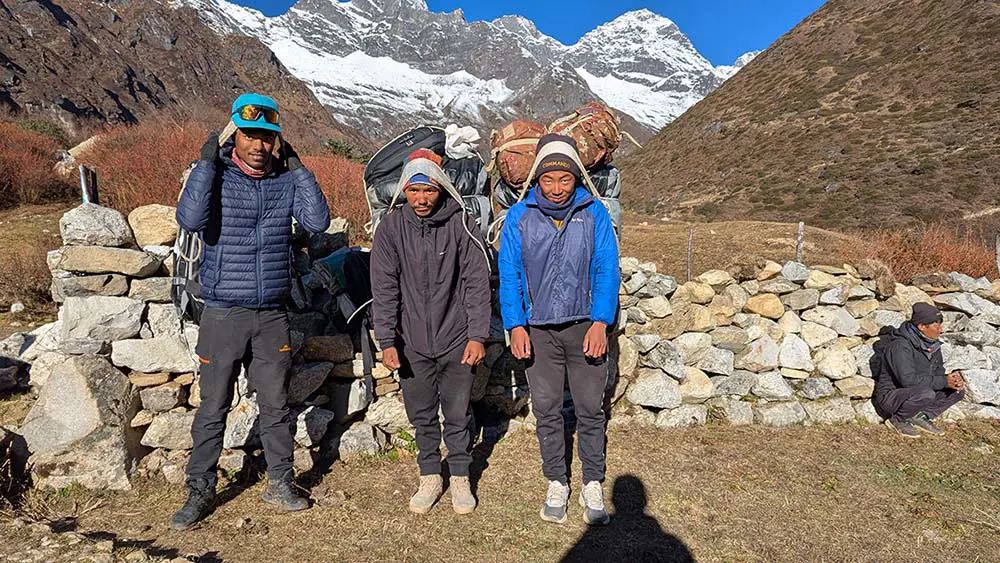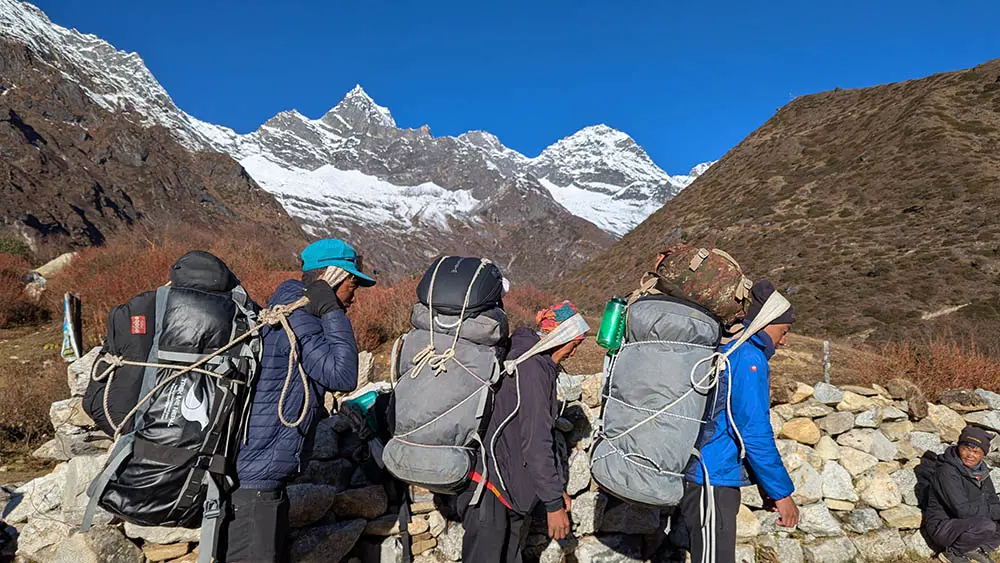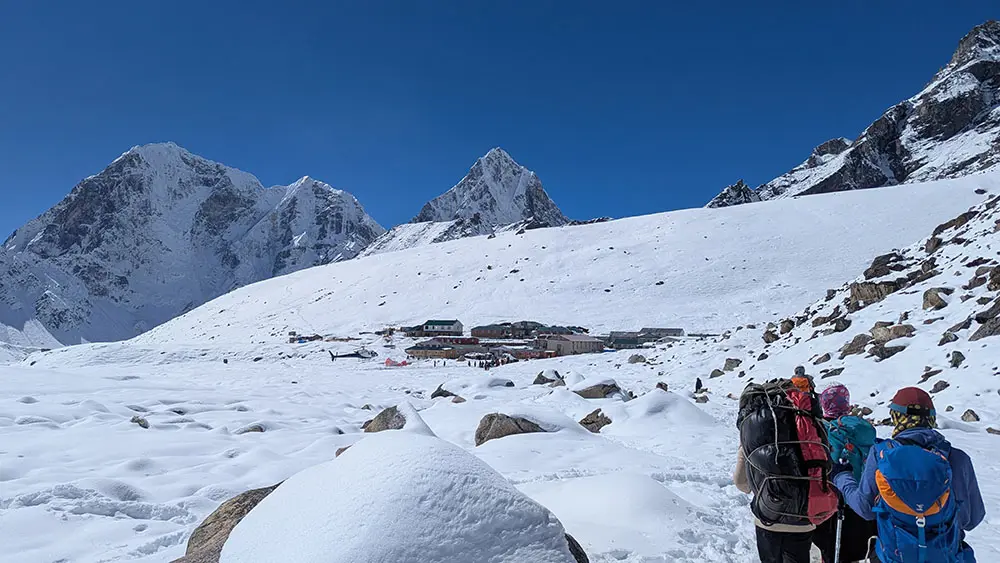

Everest Porters Key Information: Summary Table
| Particulars | Description |
| Trekker-to-Porter Ratio (Porter Allocation) | (2:1) One porter per two trekkers. For trekkers with children, one porter per child is required. |
| Daily Load Limit | Porters are recommended to carry 10-12 kg per trekker. Extra loads are discouraged for safety reasons. |
| Pay and Compensation | Porters earn $15–$20 per day, with additional bonuses for exceptional work and extended treks. |
| Insurance Coverage | All porters are covered by insurance for the duration of the trek by the trekking agency they trek with, ensuring their health and safety. |
| Child Porter Requirement | An individual porter is required for children to carry their personal belongings and provide support. |
| Health & Safety | Regular health check-ups and acclimatization before high-altitude treks, with access to emergency care. |
| Gear Provision | Porters receive high-quality gear, including boots, jackets, gloves, and sleeping bags. |
| Respect for Weight Limits | Trekkers must follow the 10-12 kg weight limit per trekker to avoid overburdening porters. |
| Ethical Tourism | Trek Me Nepal follows guidelines from the International Porter Protection Group (IPPG) to ensure fair treatment. |
| Generosity and Appreciation | Tipping porters and showing gratitude with a simple "Dhanyabad" goes a long way in supporting their livelihoods. |
When you embark on an unforgettable adventure to Everest Base Camp, which is one of the famous trekking destination in Nepal, you are walking on the shoulders of the resilient Everest Porters.
These unsung heroes are the backbone of the trekking industry, carrying heavy loads across treacherous terrain, enabling trekkers worldwide to fulfill their dreams of reaching the top of the world.
However, despite their crucial role in Nepal's booming adventure tourism sector, the Everest Porters face harsh conditions, low pay, and significant health risks. At Trek Me Nepal, we understand the importance of responsible tourism and the need to support Everest Porters with dignity and respect.
Let’s explore the lives of these incredible individuals and how our agency ensures that porters are compensated fairly for their hard work.
Everest Porters are hardworking individuals, often from local Sherpa, Tamang, Rai, and other mountain communities, who assist trekkers by carrying their equipment, supplies, and other necessary gear to Everest Base Camp and beyond.

Their job involves traversing rugged mountain trails and providing logistical support for the trekking industry.
Responsibilities of an Everest Porters:
• Carrying Trekker’s Luggage: This includes tents, food supplies, gear, and other necessities.
• Route Navigation: Porters know the local terrain intimately and help guide trekkers through the most challenging sections.
• Providing Support in High Altitudes: Many porters work in high-altitude regions, often facing risks associated with low oxygen levels and extreme weather conditions.
An average day for an Everest Porter starts early, usually before dawn, with a quick breakfast of dal bhat (lentils and rice) or tea. They load their “namlo” (head strap) with 20-24 kg of weight and start the challenging journey to their next destination, often covering 10 to 20 kilometres per day in rugged mountain conditions.

Challenges Faced by Everest Porters:
a) Backbreaking Loads: Porters often carry loads that exceed 30 kg (66 lbs), which can lead to long-term physical strain and injury.
b) Altitude-Related Health Risks: With reduced oxygen at higher altitudes, porters are prone to Altitude Sickness (AMS), which can lead to dizziness, headaches, and even life-threatening complications if not properly addressed.
c) Low Pay and Long Hours: Despite their demanding work, many porters are paid as little as $10 - $20 a day, which does not adequately compensate them for the risks and hard work they endure.
d) Lack of Proper Gears: Many porters do not have access to proper footwear, clothing, or equipment, which leaves them vulnerable to the harsh mountain environment.
Despite being crucial for Nepal's adventure tourism sector, porters often face harsh working conditions. The physical toll of carrying heavy loads across rugged terrain at high altitudes is immense.
The low pay that many porters receive does not reflect the magnitude of their work, and it has led to widespread concern regarding their welfare.

News Reports Highlighting Concerns:
"Despite being crucial for Nepal's booming adventure tourism, porters carrying backbreaking loads face harsh conditions, low pay, and health risks. This raises concerns about the human cost behind Everest expeditions."
Such reports have sparked a necessary dialogue about the welfare of porters in the trekking industry. However, at Trek Me Nepal, we take a different approach.
We believe in fair compensation, providing proper gear, and ensuring our porters are well taken care of throughout their journeys.
We recognize the critical role that Everest Porters play in the success of any trekking expedition, and we are committed to supporting them fairly and responsibly.
At Trek Me Nepal, we go the extra mile to ensure that our porters are treated with respect and dignity. Here’s how we make a difference:
At Trek Me Nepal, we pay our porters above industry standards. We ensure that they receive fair wages that reflect the challenging nature of their work.
Our porters earn a fair daily wage starting from $15–$20, with additional bonuses for exceptional work and extended treks.
If possible, we do provide our porters with high-quality gear, including boots, jackets, gloves, and sleeping bags, to ensure their safety and comfort on the trail.
By supplying these essentials, we help reduce the risk of injury and health complications related to the cold and altitude.
Our trekking company provides periodic health check-ups and ensures that porters are properly acclimatized before heading to higher altitudes.
We also ensure that porters have access to medical treatment in case of emergency. Their health and safety are our top priority.
We believe in the long-term empowerment of our porters. In addition to providing fair wages and proper gear, high-altitude trekking safety, and guiding techniques.
This helps enhance their skills and opens up opportunities for career advancement. We also support & empower capable porters for transforming their careers from Porters to guides.
As part of our commitment to ethical tourism, we adhere strictly to the guidelines set forth by organizations like the International Porter Protection Group (IPPG). This ensures that we maintain ethical practices in hiring, pay, and treatment of porters.
We also educate our clients on responsible trekking practices and the importance of supporting porters sustainably.
As a trekking company, we encourage our trekkers to play an active role in supporting the well-being of porters. Here are a few ways you can make a difference:
| Particulars | Details |
| Respect Weight Limits | Follow the recommended 10-12 kg limit per trekker to reduce the burden on porters. For every two trekkers, one porter is assigned, so you mustn’t overpack. |
| Child Porters | If you are trekking with children, an individual porter will be required for each child to ensure their safety and comfort. |
| Tip Generously | A small tip can go a long way in improving the livelihood of porters. |
| Be Appreciative | A simple “dhanyabad” (thank you in Nepali) shows your respect and gratitude. |
| Donate Old Gear | If you have extra gear like jackets, gloves, or shoes, consider donating them to porters in need. |
| Avoid Paying for Extra Loads | While porters may sometimes carry more weight than the recommended limit if offered high pay, this poses a significant risk to their health and safety. It’s important to respect weight limits and not encourage unsafe practices, especially in high-altitude environments. |
For trekkers traveling with children, it’s necessary to hire an individual porter for each child. This ensures that the child’s personal belongings are carried safely, and the porter can offer necessary assistance for the child throughout the trek.
Trek Me Nepal, including all the trekking agencies, must ensure that all the porters are covered by insurance for the duration of the trek. This provides peace of mind to both porters and trekkers, knowing that in the event of an emergency, appropriate care and support are available.
We believe that the safety and well-being of our porters are just as important as that of our trekkers.
The International Porter Protection Group (IPPG) is a UK-based charity dedicated to improving the health, safety, and working conditions of mountain porters, particularly in Nepal.
Founded in 2011, IPPG aims to raise awareness among trekking companies, guides, and trekkers about the challenges faced by porters, including exposure to extreme weather, high altitudes, and inadequate equipment.
| Aspect | Details |
| Mission | Improve safety, health, and working conditions for porters in the trekking industry worldwide. |
| Key Activities | - Educating trekkers on porter safety - Providing clothing and footwear through banks - Fundraising - Building porter shelters - Running an emergency relief fund - Lobbying the government - Encouraging ethical policies among trekking companies - Operating a porter shelter in Nepal - Cooperating with other NGOs - Organizing conferences and events. |
| Progress Since 1997 | - Less frequent unprepared porters - Sicker porters now accompanied by trekkers or guides - Government interest in enforcing legislation - Support from local organizations like TAAN and NMA. |
| Other Porter NGOs | - CAN (Nepal): Builds shelters and supports schools/health posts. - KEEP (Nepal): Porter clothing bank. - KPAP (Tanzania): Fair treatment & education. - IMEC (Peru/Tanzania): Education & clothing. - PPUK (Nepal): Supporting porter projects. - Tourism Concern (UK): Lobbying and advocacy. |
| Porter Shelters | Details |
| Gokyo Porter Shelter | - Latest project by CAN (Community Action Nepal). - Rescue post room addition in 2009. - Site agreed by lodge owners and National Park. - Project cost: approx. $90,000. - Expected staffing and construction in 2010. |
| GorakShep Porter Shelter | - Located below Kala Patthar, at 5184m (17000 feet). - Opened with help from CAN, project manager Ian Wall. - Provides crucial shelter at extreme altitude. - Well-used: 1258 bed nights (Autumn 2008), 1055 bed nights (Spring 2009). - Supported by large donations from IPPG. |
| Machermo Porter Shelter and Rescue Post | - Established with ongoing growth. - Provides food (rice, dal, tea) at cost for porters. - Sunroom too small for porter talks; plans to build a larger sunroom for talks and day use. - Donations sought for construction. |
Everest Porters play an indispensable role in the success of Nepal’s trekking industry, yet they often face harsh working conditions, low pay, and significant health risks. At Trek Me Nepal, we are committed to changing this narrative by ensuring fair wages and ethical treatment for our porters.
As trekkers, we all share the responsibility of supporting these incredible individuals and contributing to sustainable tourism in Nepal. By choosing to trek with Trek Me Nepal, you are helping make a positive impact on the lives of Everest Porters, ensuring that they continue to thrive alongside the growing adventure.
Important Note:
Apart from trekking porters, there is another category of porters in the Everest region who transport goods such as food, fuel, and supplies to lodges and tea houses in remote areas. These transportation porters play a vital role in supporting the hospitality infrastructure in the mountains.
Unlike trekking porters, they are not bound by fixed weight limits and carry loads based on their capacity. Their pay is usually determined by the weight and distance covered, making their work equally strenuous and essential to the functioning of tourism in the Everest region.
Trek Me Nepal Archives
Check out recent travel trends and news by Trek me Nepal
More Reasons Why Travellers Trust Us
Bipin Thapa
Operation Manager | Official Trekking Guide
Anyone who has trekked before knows trekking requires planning, and a deep understanding of the land. That is where Bipin Thapa Magar comes in. As the Operations Manager at Trek Me Nepal, he is the ba... Read More